Mali profile - Timeline
- Published
A chronology of key events:
11th century - Empire of Mali becomes dominant force in the upper Niger basin, its period of greatness beginning under King Sundiata in 1235 and peaking under Mansa Musa who ruled between 1312 and 1337 and extended empire to the Atlantic.
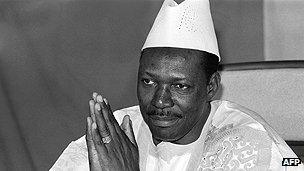
Moussa Traore took power in a 1968 coup and ruled until 1991
14th-15th centuries - Decline of the Empire of Mali, which loses dominance of the gold trade to the Songhai Empire, which makes its base in Timbuktu - historically important as a focal point of Islamic culture and a trading post on the trans-Saharan caravan route.
Late 16th century - Moroccans defeat the Songhai, make Timbuktu their capital and rule until their decline in the 18th century.
19th century - French colonial advance, and Islamic religious wars which lead to creation of theocratic states.
1898 - France completes conquest of Mali, then called French Sudan.
1959 - Mali and Senegal form the Mali Federation, which splits a year later.
Independence
1960 - Mali becomes independent with Modibo Keita as president. It becomes a one-party, socialist state and withdraws from the Franc zone.
1968 - Keita ousted in coup led by Lieutenant Moussa Traore.
1977 - Protests erupt following Keita's death in prison.
1979 - New constitution provides for elections; Traore re-elected president.
1985 - Mali and Burkina Faso engage in border fighting.
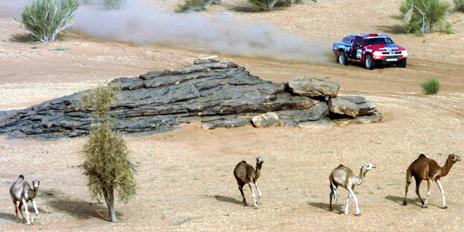
Mali used to be on the route of the gruelling Paris to Dakar rally
1991 - Traore deposed in coup and replaced by transitional committee.
Democracy
1992 - Alpha Konare wins multiparty elections to become Mali's first democratically-elected president.
1995 - Peace agreement with Tuareg tribes leads to return of thousands of refugees.
1999 - Former President Moussa Traore sentenced to death on corruption charges, but has his sentence commuted to life imprisonment by President Konare.
1999 October - Several people killed in fighting in the north between members of the Kunta tribe and an Arab community over local disputes.
2000 February - Konare appoints former International Monetary Fund official Mande Sidibe prime minister.
2001 December - Manantali dam in southwest produces its first megawatt of hydro-electricity, 13 years after it was completed.
Amadou Toure
2002 April - Amadou Toumani Toure elected president by landslide. Poll is marred by allegations of fraud.
2002 September - France says it will cancel 40% of debts owed to it by Mali, amounting to some 80m euros ($79m, £51m).
2002 October - Government resigns, without public explanation. New "government of national unity" is unveiled.
2003 August - Clashes between rival Muslim groups in west kill at least 10 people.
2004 April - Prime Minister Mohamed Ag Amani resigns and is replaced by Ousmane Issoufi Maiga.
2004 September - Agriculture minister says severe locust plague has cut cereal harvest by up to 45%.
2005 June - World Food Programme warns of severe food shortages, the result of drought and locust infestations in 2004.
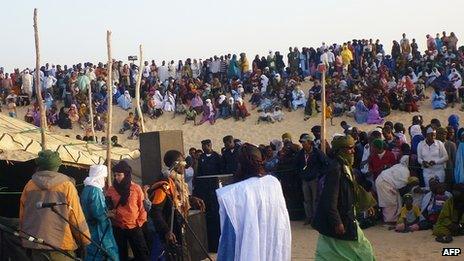
Mali's popular annual Desert Festival - described as a Saharan Woodstock - was moved closer to Timbuktu because of security concerns
2006 June - The government signs an Algerian-brokered peace deal with Tuareg rebels seeking greater autonomy for their northern desert region. The rebels looted weapons in the town of Kidal in May, raising fears of a new rebellion.
2007 April - President Toure wins a second five-year term in elections.
2007 July - The ruling coalition, Alliance for Democracy and Progress (ADP), strengthens its hold on parliament in elections.
Rebel activity
2007 August - Suspected Tuareg rebels abduct government soldiers in separate incidents near the Niger and Algerian borders.
2008 May - Tuareg rebels kill 17 soldiers in attack on an army post in the northeast, despite a ceasefire agreed a month earlier.
2008 December - At least 20 people are killed and several taken hostage in an attack by Tuareg rebels on a military base in northern Mali.
2009 February - Government says the army has taken control of all the bases of the most active Tuareg rebel group. A week later, 700 rebels surrender their weapons in ceremony marking their return to the peace process.
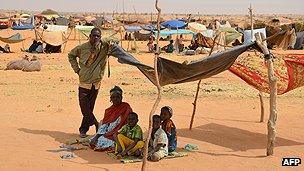
Conflict in the north of the country prompted thousands to flee
2009 May - Algeria begins sending military equipment to Mali in preparation for a joint operation against Islamic militants linked to al-Qaeda.
2009 August - New law boosts women's rights, prompts some protests.
2010 January - Annual music event - Festival in the Desert - is moved from a desert oasis to Timbuktu because of security fears.
Terror challenge
2010 April - Mali, Algeria, Mauritania and Niger set up joint command to tackle threat of terrorism.
2012 January - Fears of new Tuareg rebellion following attacks on northern towns which prompt civilians to flee into Mauritania.
2012 March - Military officers depose President Toure ahead of the April presidential elections, accusing him of failing to deal effectively with the Tuareg rebellion. African Union suspends Mali.
2012 April - Tuareg rebels seize control of northern Mali, declare independence.
Military hands over to a civilian interim government, led by President Dioncounda Traore.
2012 May - Junta reasserts control after an alleged coup attempt by supporters of ousted President Toure in Bamako.
Pro-junta protesters storm presidential compound and beat Mr Traore unconscious.
The Tuareg MNLA and Islamist Ansar Dine rebel groups merge and declare northern Mali to be an Islamic state. Ansar Dine begins to impose Islamic law in Timbuktu. Al-Qaeda in North Africa endorses the deal.
2012 June-July - Ansar Dine and its Al-Qaeda ally turn on the MNLA and capture the main northern cities of Timbuktu, Kidal and Gao. They begin to destroy many Muslim shrines that offend their puritan views.
2012 August - Prime Minister Cheick Modibo Diarra forms a new government of national unity in order to satisfy regional demands for a transition from military-dominated rule. The cabinet of 31 ministers includes five seen as close to coup leader Capt Amadou Sanogo.
2012 Autumn-Winter - Northern Islamist rebels consolidate their hold on the north. They seize strategically important town of Douentza in September, crossing into the central part of Mali and closer to the government-held south-west.
2012 November - The West African regional grouping Ecowas agrees a coordinated military expedition to recapture the north, with UN and African Union backing. Preparations are expected to take several months.
2012 December - Prime Minister Cheick Modibo Diarra resigns, allegedly under pressure from army leaders who oppose plans for Ecowas military intervention. President Traore appoints a presidential official, Django Sissoko, to succeed him. The UN and US threaten sanctions.
French intervention
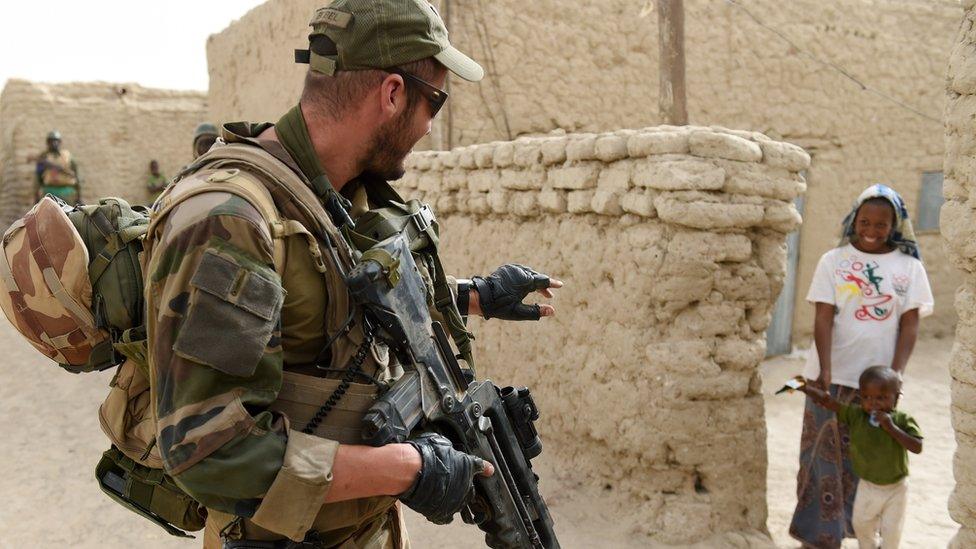
French troops have been helping the country fight jihadists since 2013
2013 January - Islamist fighters capture the central town of Konna and plan to march on the capital. President Traore asks France for help. French troops rapidly capture Gao and Timbuktu and at the end of the month enter Kidal, the last major rebel-held town. European countries pledge to help retrain the Malian army.
2013 April - France begins withdrawal of troops. A regional African force helps the Malian army provide security.
2013 May - An international conference pledges $4bn to help rebuild Mali.
2013 June - Government signs peace deal with Tuareg nationalist rebels to pave way for elections. Rebels agree to hand over northern town of Kidal that they captured after French troops forced out Islamists in January.
2013 July-August - Ibrahim Boubacar Keita wins presidential elections, defeating Moussa Mara.
France formally hands over responsibility for security in the north to the Minusma UN force.
2013 September - President Keita appoint banking specialist Oumar Tatam Ly prime minister.
2013 September-November - Government relations with Tuareg separatists in the north steadily worsen, with occasional clashes.
2013 December - Parliamentary elections give President Keita's RPM 115 out of 147 seats.
France announces 60% reduction in troops deployed in Mali to 1,000 by March 2014.
2014 April - President Keita appoints former rival Moussa Mara prime minister in a bid to curb instability in the north.
2014 May - Fragile truce with Tuareg MNLA separatists breaks down in north. Separatists seize control of Kidal city and the town of Menaka, Agelhok, Anefis and Tessalit.
2014 September - Government, separatists begin new round of talks in Algeria to try end conflict over northern Mali, or Azawad as the secessionists call it.
Separatist MNLA opens an ''Azawad embassy'' in the Netherlands.
2014 October - Nine UN peacekeepers killed in the north-east - the deadliest attack so far on its mission in Mali.
2015 January - Mali's health minister says the country is free of the Ebola virus, after 42 days without a new case of the disease since October.
2015 April - Upsurge in fighting as Coordination of Azawad Movements northern rebels clash with UN peacekeepers in Timbuktu and seize town of Lere, try to recapture Menaka from pro-government militia.
2015 May - French troops kill leading al-Qaeda commanders Amada Ag Hama and Ibrahim Ag Inawalen in northern raid. Both were suspected of kidnapping and killing French citizens.
A peace accord to end the conflict in the north of Mali is signed by the government and several militia and rebel factions.
2015 June - Government and ethnic Tuareg rebels sign peace deal aimed at ending decades of conflict. The government gives the Tuareg more regional autonomy and drops arrest warrants for their leaders.
2015 July - Craftsmen in Mali working for the United Nations rebuild the world-renowned mausoleums in Timbuktu which were destroyed by Islamists in 2012.
2015 August - Seventeen people killed in attack by suspected Islamist militants on a hotel in the central Malian town of Sevare
2015 November - Islamist gunmen attack the luxury Radisson Blu hotel in the capital Bamako, killing 22.
2016 August - Several attacks on foreign forces. More than 100 peacekeepers have died since the UN mission's deployment in Mali in 2013, making it one of the deadliest places to serve for the UN.
A Malian jihadist is found guilty of ransacking the fabled desert city of Timbuktu. He expressed regret in the unprecedented trial before the International Criminal Court.
2017 January - At least 37 people are killed by a car bomb at a military camp in Gao housing government troops and former rebels brought together as part of a peace agreement.
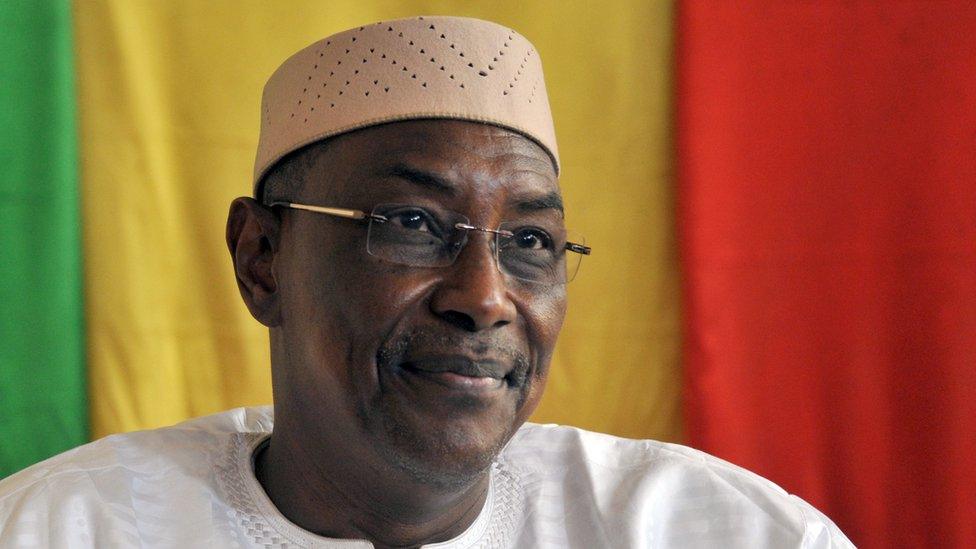
Prime Minister Abdoulaye Maiga is seen as a close ally of President Ibrahim Boubacar Keita
2017 February - Malian soldiers and rival militia groups including Tuareg separatists take part in a joint patrol, a key part of a peace agreement reached in 2015.
2017 April - President Ibrahim Boubacar Keita announces a new government, appointing close ally Abdoulaye Idrissa Maiga as prime minister.
2017 June - Al-Qaeda-aligned group Nusrat al-Islam wal Muslimeen claims responsibility for an attack on an hotel popular with Westerners east of Bamako, killing two civilians.
2018 January - Some 14 soldiers are killed in a suspected Islamist attack on a military base at Soumpi. Elsewhere, 26 civilians die after their vehicle hits a landmine.
2018 July - President Keita is re-elected as jihadist violence continues to plague the north and east of the country.
2020 August - President Keita is overthrown in a military coup after months of protests demanding his resignation.